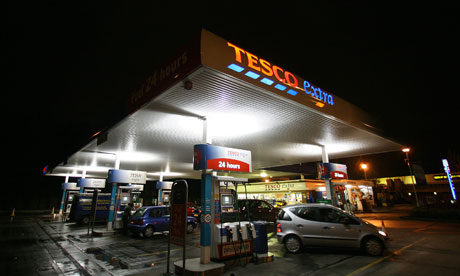Tesco Launches Face-Scanners in Petrol Stations across the UK
Tesco has confirmed a ground-breaking deal with Amscreens to install face scanning technology at petrol stations to play targeted adverts to customers at tills.
News – November 2013
Supermarket Tesco has signed a ground-breaking deal with Lord Alan Sugar’s digital media company Amscreens to install hi-tech ‘OptimEyes‘ face scanning technology at 450 petrol stations across the UK. The data gathered will be used, in real-time, to match advertisements with customers at the till. The screens, developed in partnership with Quividi, are predicted to reach a weekly audience of more than five million.
Using an inbuilt camera to detect key traits in the customer – such as age, race and sex – and log the number of viewers, the time and location, the screens enable advertisers to measure the type and volume of people viewing their ads in any given location, at any time of day. 
The screens promise to optimise campaign schedules and advert success rates based on audience analysis.
Peter Cattell, Category Director for Tesco petrol stations commented: “We’re always looking to work with partners who provide innovative ways to enhance the customer shopping experience. This new dynamic screen product from Amscreen provides the perfect means for us to do this. The ability to tailor content based on time and location means it can be extremely useful and timely for our customers.”
Amscreen CEO and Chairman Simon Sugar, eldest son of Lord Sugar, described it as being “like something out of Minority Report”, saying the technology, which they plan to roll out into as many supermarkets as possible, could change the face of British retail.
Privacy Concerns
However, the Tesco screens have come under attack for compromising privacy rights. Although a Tesco spokesperson was keen to point out that the technology does not use facial recognition software or eyeball scanners, neither does it record data or store images in any way. This statement is aligned with OptimEyes’ official message that “the technology is non-intrusive, does not record or identify personal images and meets with privacy and data protection requirements”.
And in the online world human behaviour prediction systems are old news. Facebook uses something similar to places ads, rank news feed posts and suggest friends. Netflix and Amazon use versions to send out targeted movie recommendations or shopping suggestions. And these Tesco screens probably signal just the first step in human behaviour prediction in the offline world.
















There are no comments
Add yours